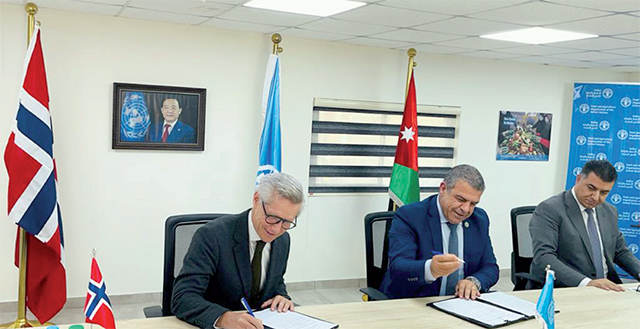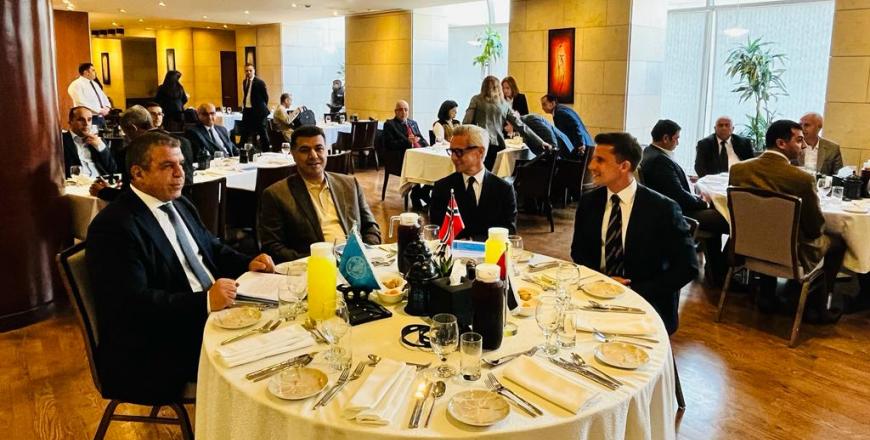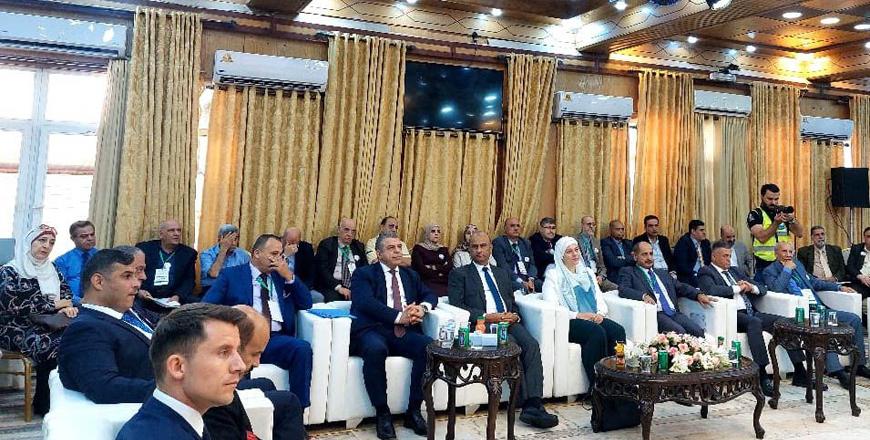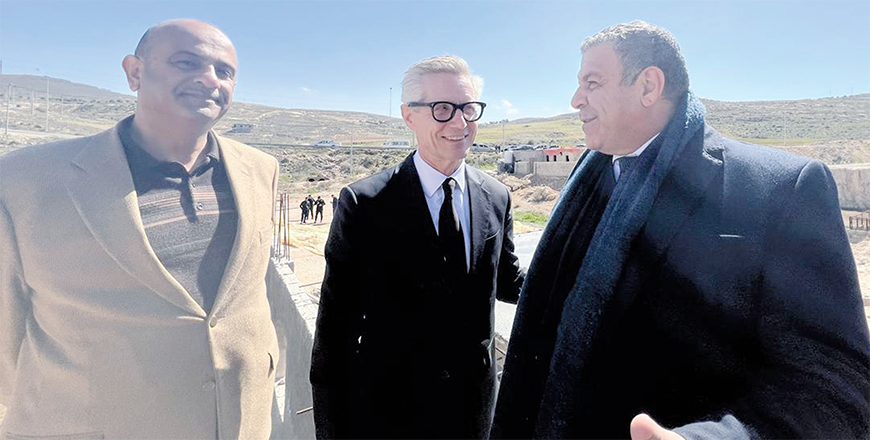You are here
Norway, FAO promote food security, decent work opportunities in Jordan
By JT - Nov 21,2022 - Last updated at Nov 21,2022

Ambassador of Norway to Jordan Espen Lindbæck and Food and Agriculture Organisation of the United Nations Representative to JordanNabil Assaf sign an agreement on Sunday (Photo courtesy of FAO)
AMMAN — The Ambassador of Norway to Jordan, Espen Lindbæck, and the Food and Agriculture Organisation of the United Nations (FAO) Representative to Jordan, Nabil Assaf, on Sunday signed a $1,455,463 million agreement to promote the sustainability of food security and decent work opportunities in Jordan through the Norwegian-funded “Transformation to more efficient, inclusive, resilient, and sustainable agri-food systems” project, during a ceremony attended by Agriculture Minister Khalid Hneifat.
This initiative targets Jordanians and Syrian refugees by enhancing their capacities to successfully participate in efficient and sustainable agri-food systems, building their capacity for decent work opportunities and enhancing resilience to poverty and hunger, according to a statement from FAO.
Lindbæck said: “We are very happy to enter into this new partnership between FAO and the Norwegian embassy in Jordan. This project, aiming to enhance the transformation to more efficient, inclusive, resilient and sustainable agri-food systems in Jordan, is highly needed to meet the challenges in the agriculture sector. With this, food security for Jordanians and refugees in marginalised communities will be sustained, and the opportunities for decent work opportunities will be enhanced.
“We are also very pleased that FAO will implement this project in close coordination with the Ministry of Agriculture, meeting the aims of the Jordanian government to ensure food security in Jordan and develop sustainable ways of agriculture. In a world that is seeing increased tension and insecurity, national food security and especially for the most vulnerable, should be on the top of our agenda.”
Assaf said: “With the agri-food sector in Jordan supporting the livelihoods of about a quarter of the population, there is a greater urgency to address food security. It is one of the largest sources of employment for working-age refugees and women in rural communities.
“The programme is aligned with FAO-Government Priority 2: Sustainable Agriculture and Natural Resources Management. It is also aligned to the Regional Initiatives ‘Water Scarcity’ and ‘Building Resilience for Enhanced Food Security and Nutrition’.”
Hneifat affirmed the ministry’s appreciation for the role played by the Norwegian embassy and FAO in Jordan in supporting sustainable agricultural systems. He stressed the need for concerted efforts to serve the interests of citizens in marginalised communities, find opportunities to support rural communities and women in particular, and the need to implement projects aimed at optimal utilisation of available water resources, as this project reflects the possibility of integrating activities to achieve food security, preserve water resources and create suitable opportunities to improve livelihoods.
The project’s overall aim is to contribute to the sustainable achievement of food security among rural Syrian refugees and vulnerable Jordanian hosts, by enhancing their capacity to successfully participate in efficient sustainable agri-food systems and building their capacities for decent work opportunities as well as advocating for food waste reduction which has a profound effect on sustainability, food security and rural development through training sessions.
As such, the project will address the capacity building, assets, financing and employment needs of the targeted beneficiaries, through a series of activities related to capacity enhancement, asset distribution, access to micro-financing, access to markets and job creation, the statement said.
Furthermore, the project will select the beneficiaries based on socio-economic criteria through FAO, CBOs involved in the agricultural/agri-food value chains, in collaboration with the Ministry of Agriculture. The selection will encourage the inclusion of different community categories, including the vulnerable; Syrian refugees, women-led households, people with disabilities and elderly people who are still able to partake in activities and respond to the objectives of the project.
The project will have a particular focus on youth empowerment and enhancing their employment status to ensure sustainable income generation and nutrition status. Overall, the project will target 300 beneficiaries, 50 per cent of which will be women, 70 per cent of which will be Jordanians, and 30 per cent will be Syrian refugees in host communities. The project is intended to create jobs for 300 workers, the statement added.
Related Articles
AMMAN – The Government of Norway and the Food and Agriculture Organisation of the United Nations (FAO), in cooperation with the Ministry of
AMMAN — The Jordan Agricultural Engineers Association in Irbid organised the third agricultural scientific conference, titled “The State of
AMMAN — The Government of Norway and the Food and Agriculture Organisation of the United Nations (FAO), in cooperation with the Ministry of


















